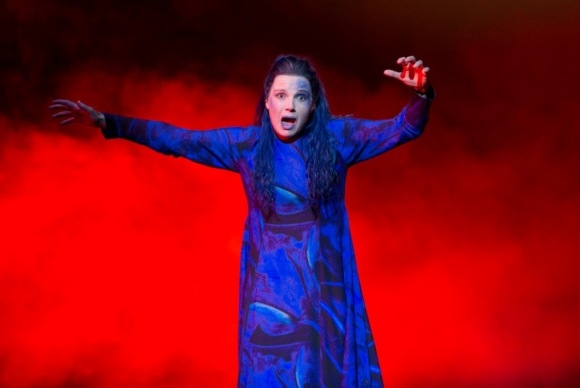Moses in Egypt (Welsh National Opera – tour)

© Richard Hubert Smith
David Pountney‘s new production keeps things stark and simple, and is all the more powerful for that. In a bold and hugely effective move by lighting designer Fabrice Kebour, the first ten minutes (depicting the plague of darkness) are played in total blackout before the plague is lifted to reveal Marie-Jeanne Lecca‘s colour-coded costumes – reds and oranges for the Egyptians, blues and greens for the Jews, with the former in Egyptian-influenced headdresses and make-up and the latter in loose, shabby modern suits.
Radiating a restless manic energy that was enhanced by his beetle-like orange costume, Andrew Foster-Williams was by turns darkly amusing and genuinely terrifying as the despotic, capricious Faraone, even if his voice seemed a touch small for the role in a couple of places. Christine Rice was mesmerising as his conflicted wife Amaltea (a secret converted to Judaism), her rich, supple mezzo powerful and even throughout the role’s wide range: the fiendishly demanding scena in act two was breathtaking.
Hungarian bass Miklos Sebestyen has exactly the right Old-Testament gravitas (his performance was a veritable masterclass in the art of minimal gesture for maximum effect) and sonorous, authoritative delivery for the title-role. It was a pity that his brother Aronne doesn’t have more to do, as Barry Banks‘s clarion tone and fearless top notes were a joy (though there’s plenty of time for that elsewhere in the run, since he also tackles the mammoth role of Arnold in William Tell). Contrasting nicely with Banks was the young Scottish tenor Nicky Spence, who has stage-presence in spades as the bitchy, malevolent high priest Mambre and whose voice has acquired darker, more dramatic tones since I last heard him.
'persuasive advocacy for a work that deserves to be better known'
From a vocal point of view I couldn’t quite warm to David Alegret as Faraone’s son Osiride, despite his sympathetic and committed acting in a wet blanket of a role. He has the easy upper register that’s so crucial in this repertoire, but the voice is so small that at times it almost seemed that he was marking rather than singing full voice, though he blended beautifully with Claire Booth‘s equally small-scale Elcia.
Best known as a superb exponent of contemporary repertoire, the light lyric soprano Booth was slightly odd casting here: her role was written for Rossini’s eventual wife Isabelle Colbran, who was famed for her dark timbre and juicy lower register as much as for her agility and bright top notes (at times I wondered whether the part mightn’t have been a better fit for Rice), and much of it seemed to lie below Booth’s natural comfort zone as well as calling for a rather more dramatic instrument. Despite her prodigious coloratura facility she doesn’t really strike me as a natural Rossini animal, but she’s never less than compelling – particularly in the grief-deranged cabaletta over her beloved’s dead body.
Not all of the score is top-drawer Rossini (recitatives in particular are dry and four-square), but Simon Philippo and the orchestra treat it as if it is. There's persuasive advocacy all round for a work that may not quite be in the 'neglected masterpiece' category but which certainly deserves to be better known.










